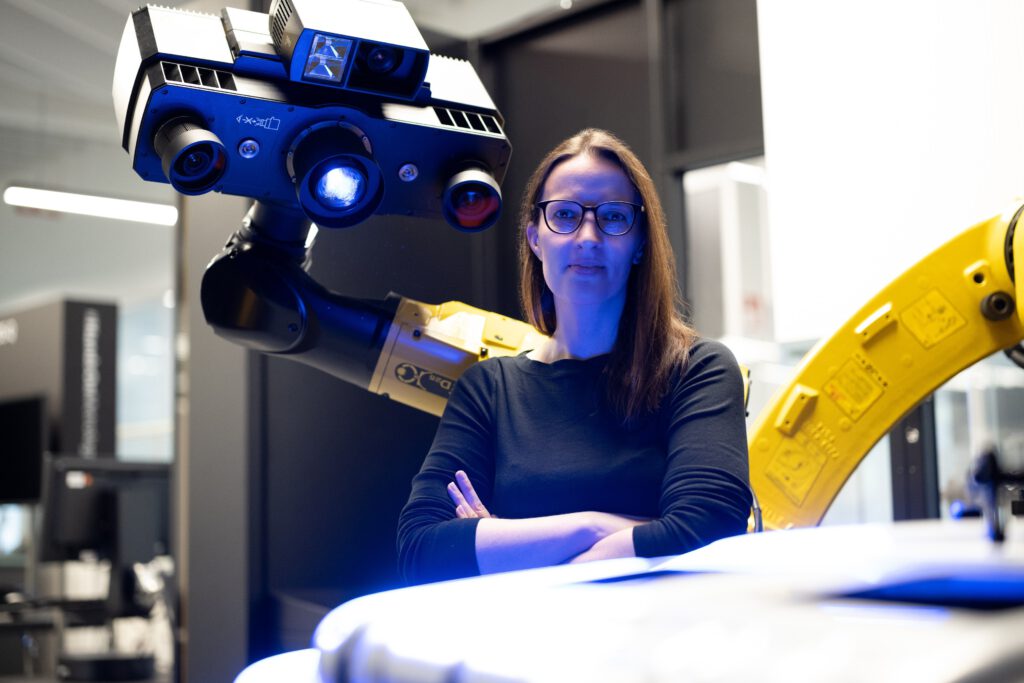Research interests
- Optics and photonics, particularly involving imaging, microscopy, and optical metrology
- Instrument design, development, and application across a wide range of applications (from the life sciences to the physical sciences)
- Development of image and data processing and analysis tools
- Machine learning and its application in image and data analysis
- Statistical methods for large datasets
- Open software and hardware tools for imaging and microscopy
Short curriculum vitae
 Ulrike Boehm, Ph.D., (pronunciation) pursued a degree in Physics from the Technical University of Munich, Germany. During her undergraduate studies, she completed several internships at diverse research institutions across Germany. Ulrike graduated magna cum laude with a research project on correlative microscopy at liquid nitrogen temperature, which she conducted in the group of Wolfgang Baumeister at the Max Planck Institute for Biochemistry in Martinsried/Munich, Germany. »
Ulrike Boehm, Ph.D., (pronunciation) pursued a degree in Physics from the Technical University of Munich, Germany. During her undergraduate studies, she completed several internships at diverse research institutions across Germany. Ulrike graduated magna cum laude with a research project on correlative microscopy at liquid nitrogen temperature, which she conducted in the group of Wolfgang Baumeister at the Max Planck Institute for Biochemistry in Martinsried/Munich, Germany. »
While pursuing her Ph.D. studies, Ulrike worked in the group of Nobel Laureate Stefan Hell at the Max Planck Institute for Biophysical Chemistry in Göttingen, Germany. Her research focused on developing a new super-resolution technique that allowed for the three-dimensional visualization of living biological structures and their dynamics at low light levels. This innovative microscopy approach combined two fluorescence microscopy techniques: REversible Saturable OpticaL Fluorescence Transitions (RESOLFT) Microscopy with reversible switchable fluorescent proteins (RSFPs) and 4Pi-Microscopy. In 2016, Ulrike successfully defended her thesis titled “4Pi-RESOLFT nanoscopy” magna cum laude at the University of Heidelberg. »
Starting in 2017, Ulrike began working as a postdoctoral fellow at the Center for Cancer Research located at the National Cancer Institute | National Institute of Health in Bethesda, Maryland, USA. This position allowed her to expand her imaging and scientific expertise as she delved into researching gene expression in living cells. To investigate this area further, Ulrike employed a range of techniques, including single-molecule imaging, super-resolution microscopy, and various biophysical and biomolecular approaches. »
Starting in 2019, Ulrike worked as a research specialist at the HHMI Janelia Research Campus located in Ashburn, Virginia, USA. In this role, she was responsible for constructing and modifying advanced optical systems such as iPALM, Lattice Light Sheet Microscope, SiMView Light Sheet Microscope, Aberration Corrected Multifocal Microscope, MOSAIC, etc. Additionally, Ulrike provided consultation and assistance to (inter)national visitors, helping them with their imaging sessions at pre-commercial microscopes located at Janelia’s Advanced Imaging Center and other systems on campus. She also managed their respective data and analysis workflows. Furthermore, Ulrike organized and taught imaging/microscopy workshops and worked on developing/ implementing image/data analysis strategies for users from all around the world. »
Beginning in March 2022, Ulrike has been employed as an R&D scientist at Carl Zeiss AG located in Oberkochen, Germany. In this role, she serves as an optical scientist and project lead within the Corporate Research & Technology department. Ulrike is responsible for developing and implementing the latest optical trends for imaging, microscopy, metrology, and other areas. »
Full curriculum vitae
A PDF version of my comprehensive curriculum vitae is available for download here.